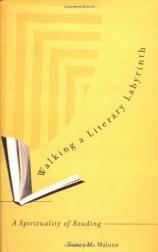Reading Group Guide
Discussion Questions
Walking a Literary Labyrinth

1. Do you agree with the author's belief that there does indeed exist a "spirituality of reading?" Can you give examples of your own in which you yourself have experienced such a spirituality?
2. Share your own literary labyrinth with the group - what significant books have you read throughout your personal journey? What role did they play in relation to the events of your life? How did they invoke a greater understanding of your own self and the world around you? At what point in the labyrinth do you feel you are in at this time?
3. Discuss the importance of fiction within the literary labyrinth. What does the author say about fiction as a means to achieving a sense of spirituality? How does this differ from reading non-fiction or biography?
4. In discussing literature's ability to offer terrific possibilities for enlightening us and acquainting us to one another, the author states, "And I, for one, must confess that this canon has more profoundly influenced me in who I am, what I think and feel and do, than, with few exceptions, the canonized saints of the Roman Catholic Church." What do you think the author is saying with regard to religion? What is your opinion on the similarities or differences between "spiritual" and "secular" reading?
5. The author defines interiority as "the conversation we're always having with ourselves," and which is most obvious through the act of reading. Discuss with the group your own sense of interiority - in what ways does a good book inspire this inner dialogue or self-realization?
6. How does the author distinguish between the ability of poetry to invoke spirituality versus that of prose? What does each of these genres offer along the course of the literary labyrinth in terms of bringing us into touch with our "inner-selves"?
7. Do you agree with the author's assertion that erotic literature should have a place in our spirituality? What do you feel is the appropriate use of eroticism in literature?
8. Re-read the passages in which the author discusses the power of reading in helping us to imagine what is not clearly or immediately comprehendible. What are some other examples of how reading opens up our imaginations to new possibilities?
9. To what extent are the author's concepts of the spirituality of reading influenced by the fact that she is a nun? Do you think that these concepts would carry any less weight had she been a teacher or a doctor or of some other profession not tied to the Church? Why or why not?
10. If at all possible (i.e., if you can name just one), discuss with the group your "favorite" book. In what ways might this book have given you a distinct understanding of yourself and the world around you? How can you apply your experiences in reading this "favorite" to the notion of reading as a spiritual journey.
11. According to the author, what role does language play in the spirituality of reading? Do you feel that only particular types of writing and language bring us closer to our inner selves, or define a higher level of spirituality?
12. Upon entering the convent, the author states that for the next 15 years, she would read nothing but "spiritual books," and that "'in renouncing the world,' I was renouncing the world of books. And I didn't even know it." What impact did her journey through this "literary desert" have in terms of her spirituality, and her view of the Catholic Church? What, if any, positive role did these years play in her life?
13. What is your opinion on the future of books and reading? With the pervasive influences of mass media and other outlets that compete for readers' attention, do you feel that one's impetus to walk one's own "literary labyrinth" is being threatened? What do you feel might be the consequences of not taking this literary journey?
Walking a Literary Labyrinth
- Publication Date: June 23, 2003
- Hardcover: 208 pages
- Publisher: Riverhead Hardcover
- ISBN-10: 1573222461
- ISBN-13: 9781573222464






